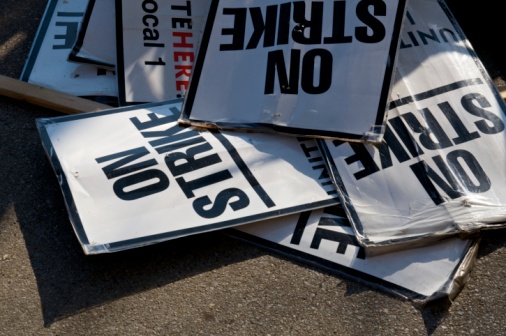
After reading “What is the Innocent Bystander Rule?”, read also “What are corporate powers?“
-
Picketing consists in walking or patrolling in the vicinity of a place of business involved in a labor dispute to inform the public about an ongoing dispute.
-
Picketing strikers cannot prevent employees of other companies from using the same premises being picketed.
- A picket, although peaceful and moving, may constitute illegal obstruction if it effectively blocks the entry and exit points of the company premises, thus violating the law and making the strike illegal.
What is picketing?
Picketing consists in walking or patrolling in the vicinity of a place of business involved in a labor dispute to inform the public about an ongoing dispute. Picketing usually accompanies a strike, but picketing as a form of protest action, may happen even if there is no strike or work stoppage.
The law says:
Article 279(b) of the Labor Code protects peaceful picketing. To wit:
Art. 279. Prohibited Activities.
xxx
(b) No person shall obstruct, impede or interfere with by force, violence, coercion, threats or intimidation any peaceful picketing by employees during any labor controversy, or in the exercise of the right of self-organization or collective bargaining, or shall aid or abet such obstruction or interference.
xxx
The “Innocent Bystander Rule” states that in situations where the picket affects not only the employer but also the business operations of other establishments owned by third parties, an injunction may be secured by the latter from the regular courts to enjoin the picket. Picketing strikers cannot prevent employees of other companies from using the same premises being picketed. A picketing labor union has no right to prevent employees of another company which is not their employer, from getting in and out of its rented premises; otherwise, it will be held liable for damages for its acts against an innocent bystander.
Under the “Innocent Bystander Rule,” the third-party employers or “innocent bystanders” who does not have employer-employee relationship with the picketing strikers, may apply for injunction with the regular courts to enjoin the conduct of the picket.
Jurisprudence says:
The “bystander establishment which is entitled to enjoin a labor strike or picket must be entirely different from, without any connection whatsoever to, either party to the dispute. If such establishment is in fact partly owned by the employer struck against, and furthermore, produces the same product and uses the same factory and machinery which said employer owns, then the bystander rule does not apply. Because of the absence of such employer-employee relationship, the NLRC cannot entertain such application for injunction from “innocent bystanders.” Only the employer of the picketers can apply for injunctive relief from the NLRC. (MSF Tire and Rubber v. Court of Appeals G.R. No. 128632, 5 August 1999)
In the case of Philippine Association of Free Labor Unions (PAFLU) vs. Judge Gaudencio Cloribel et al. (G.R. No. L-25878, March 28, 1969), the Supreme Court eloquently held that:
“The right to picket as a means of communicating the facts of a labor dispute is a phrase of the freedom of speech guaranteed by the constitution. If peacefully carried out, it cannot be curtailed even in the absence of employer-employee relationship.
The right is, however, not an absolute one. While peaceful picketing is entitled to protection as an exercise of free speech, we believe that courts are not without power to confine or localize the sphere of communication or the demonstration to the parties to the labor dispute, including those with related interest, and to insulate establishments or persons with no industrial connection or having interest totally foreign to the context of the dispute. Thus, the right may be regulated at the instance of third parties or “innocent. bystanders” if it appears that the inevitable result of its exercise is to create an impression that a labor dispute with which they have no connection or interest exists between them and the picketing union or constitute an invasion of their rights.” (Underscoring supplied.)
May a picketing activity be considered as an illegal obstruction, although such be done peacefully?
Yes, a picket, although peaceful and moving, may constitute illegal obstruction if it effectively blocks the entry and exit points of the company premises, thus violating the law and making the strike illegal. (Phimco Industries Inc. v. Phimco Industries Labor Association, G.R. No. 170830, 11 August 2010)
Alburo Alburo and Associates Law Offices specializes in business law and labor law consulting. For inquiries, you may reach us at info@alburolaw.com, or dial us at (02)7745-4391/0917-5772207.
[email-subscribers-form id=”4″]


